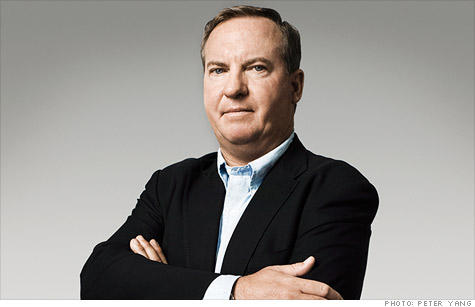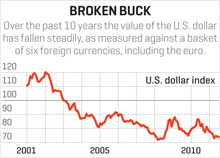Search News

Charles de Vaulx co-manages $10 billion in his "go anywhere" fund.
FORTUNE -- The global economy is as distorted as Charles de Vaulx can ever remember. Good thing, then, that the veteran value-oriented investor has the flexibility to purchase almost any type of asset for his $10 billion, New York City--based IVA Worldwide Fund (IVWAX), co-managed with Chuck de Lardemelle. Since its launch nearly three years ago, the fund has had an annualized return of 16%, vs. a 7% rise in its benchmark MSCI All-Country World Stock index. A French citizen who spent much of his youth living in Africa, de Vaulx, 49, has a long track record of success in world markets. He previously spent seven years managing the top-performing First Eagle Global Fund (SGENX) before departing in 2007 to help launch International Value Advisers. De Vaulx spoke with Fortune about how to play the declining dollar, his bets on beaten-down tech giants, and why he owns so much gold.
Q. The price of gold recently hit $1,900 an ounce. Why do you keep buying?

A. We now have over 7% of the fund's assets in gold, and it's all in the form of bullion. We feel that owning gold bullion is ultimately safer and cheaper than gold mining stocks. Owning gold is a way to express our mistrust of policymakers, be they in the U.S., Europe, Japan, or even China. Over the past few months, when you see the idiotic political debates in America regarding the debt ceiling, when you see the cacophony in Europe -- it makes you want to own gold.
But my final thought on gold is that we are value investors, after all, so why would we want to own something that has gone up sevenfold since July 2001? And I think the paradox with gold is that even though the price has gone up so much, it is still under-owned.
When would you sell gold?
What will prompt us to reduce our gold position is not so much the price of gold itself going up, but rather if equities truly become cheap. Or if by some miracle policymakers around the world start to get their act together.
You believe the U.S. dollar is in a secular decline. How does that guide your strategy?
Well, we are in a fiat currency system, and considering that America owes, let's say, half its debt to foreigners, the temptation is huge to inflate away the problem. When a credit bubble bursts, it's deflationary at the outset, but we believe long term that inflation will be the consequence of what the policymakers are doing right now. And so if one fears inflation, one has to shy away from long-dated bonds. In fact, we have a very small position where we have shorted Treasuries through futures.
We've also bought other currencies. We believe the Singapore dollar has great attributes. We have 4% to 5% of our funds in short-dated Singapore dollar bonds. The yields are puny, but at least we think it's a much sounder currency than the U.S. dollar.
So how does the falling dollar affect your view of stocks?
Inflation can be "good" for certain equities. We own Publicis Groupe, a European-based advertising agency. It's not a capital-intensive business. Advertisers are able to raise fees along with the inflation rates. MasterCard (MA, Fortune 500) is a company we think is an obvious beneficiary of inflation. It's a service company. It doesn't lend money. It acts purely as a processor. The more inflation you have, the more people will spend in nominal terms with their plastic cards. In essence, owning MasterCard is owning a stream of free cash flows and future free cash flows that can grow along with the inflation rate.
You own a few large tech companies -- Microsoft (MSFT, Fortune 500), Hewlett-Packard (HPQ, Fortune 500), and Dell (DELL, Fortune 500) -- that have struggled lately. Why?
We obviously are aware that these stocks are tainted because people think that PCs are under threat because of both cloud computing and the advent of tablets, including the iPad. We agree that these are real headwinds. But as an investor, sometimes it's okay to buy a stock if the outlook is not the rosiest, as long as it is priced in. And we believe that it is priced in.
In the case of Microsoft, earnings per share have grown year after year in spite of not only the ongoing changes in the PC world but also some bad decisions made by management. The bulk of Microsoft's earnings comes from the Windows operating system -- from sales to businesses, as opposed to consumers. We have stress-tested Microsoft using some very harsh assumptions, and under our worst-case scenario we come up with a value of $22 a share. It's around $26 now. Our base case is north of $35.
Are people too optimistic or pessimistic about stocks now?
Over the past two years I think individuals in America have been using the rearview mirror: Because bonds have done well, they've been putting a lot of money in bonds. So if anything, I think that Americans may be underinvested in equities. Unfortunately stocks and bonds are not cheap enough today that one will make a lot of money with your eyes shut for the next five or 10 years. I think one has to be nimble, and one has to navigate those markets with as much flexibility as possible. ![]()

Carlos Rodriguez is trying to rid himself of $15,000 in credit card debt, while paying his mortgage and saving for his son's college education.
| Overnight Avg Rate | Latest | Change | Last Week |
|---|---|---|---|
| 30 yr fixed | 3.80% | 3.88% | |
| 15 yr fixed | 3.20% | 3.23% | |
| 5/1 ARM | 3.84% | 3.88% | |
| 30 yr refi | 3.82% | 3.93% | |
| 15 yr refi | 3.20% | 3.23% |
Today's featured rates: